Sports
Qatar World Cup: The Event That Shook Everything
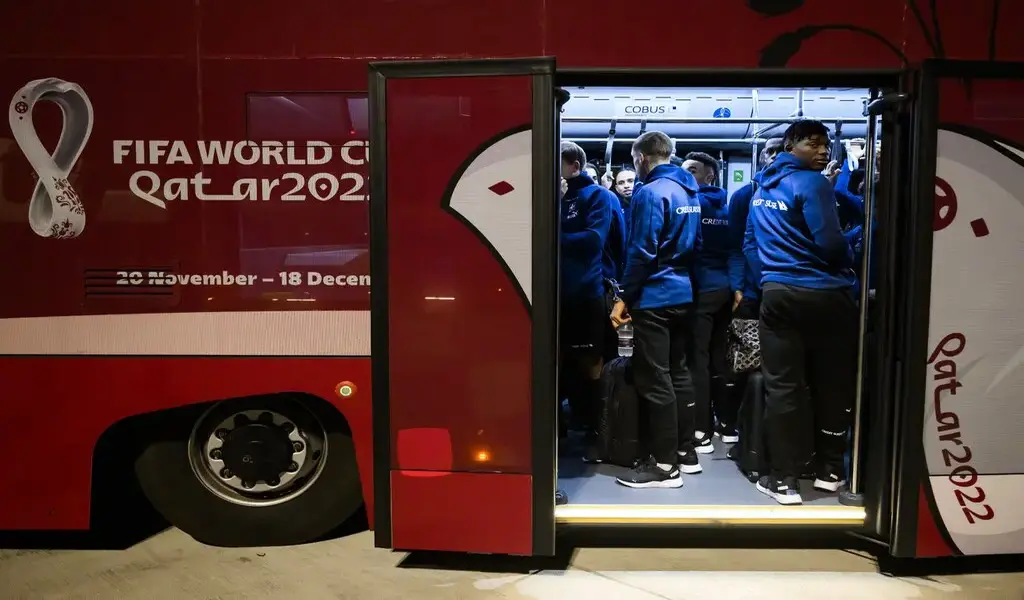
(CTN NEWS) – World Cup hosting in Qatar has upended a small nation, battered the reputation of soccer’s governing body, and altered the sport’s fabric.
When Michel Platini arrived for lunch on a chilly day in November 2010, he had planned to have a private meeting with the French president.
Instead, as Platini entered an opulent salon inside the president’s official mansion, he realised right away that Nicolas Sarkozy, the person he had come to see, was not there.
Platini was a legendary French player who in retirement had advanced to become one of the most powerful men in soccer.
Instead, Platini was pointed in the direction of a small group of people conversing across the room, where he overheard a conversation that would permanently affect the sport he had devoted his life to, disrupt the trajectory of his career, and damage his reputation.
Platini grinned as he was formally introduced to the lunch’s special guests: Qatar’s prime minister, Sheikh Hamad bin Jassim al-Thani, and his son, Sheikh Tamim bin Hamad al-Thani,
Who would take over as the nation’s undisputed leader in a few years.
The Qataris had travelled to Paris to consider a seemingly fantastical proposal: the World Cup would be held in their tiny, improbably affluent Gulf nation.
The idea has never particularly appealed to Platini, a vice president of FIFA, the world governing body of soccer.
He had stated to friends a year prior that he thought it would be bad for FIFA to allow Qatar to host the biggest athletic event ever because it has no significant soccer history and lacks fundamental facilities like stadiums.
He had already expressed his desire for the 2022 event to take place “somewhere but Qatar” to a competing United States bid only two months before.
But eventually, that afternoon, Platini’s reservations vanished. More than ten years later, it is still utterly unclear and hotly argued what exactly happened to cause him to alter his mind during lunch with a tardy Sarkozy and the two Qataris.
Platini has provided at least two different accounts of what happened; in each, he insisted that his vote was his own decision and was unaffected by other forces.
In 2019, he was detained but not charged by French investigators who were reportedly looking into the meeting.
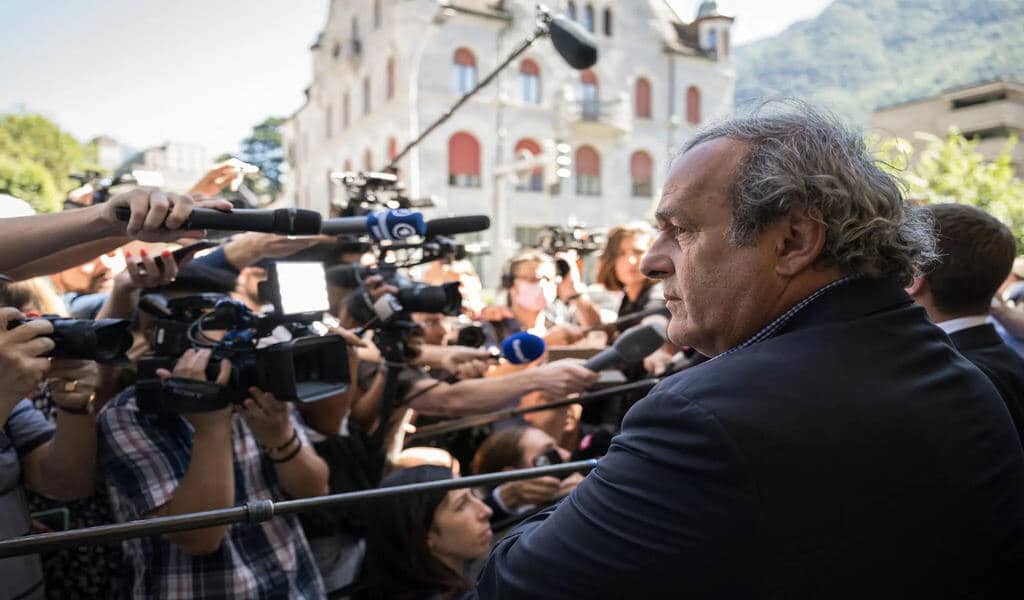
Michel Platini’s opinion on Qatar’s bid to host the World Cup mattered: As a vice president of FIFA, he was an influential voice in the vote, and a leading candidate to be running FIFA by the time the tournament took place.Credit…Fabrice Coffrini/Agence France-Presse — Getty Images
But at that time, the agreement had already been reached: Qatar was officially announced as the host nation for the 2022 FIFA World Cup one week after the lunch, in a vast conference room in Zurich.
Since then, the most watched sport in the world has been dealing with the fallout from that choice.
Since then, American investigators and FIFA itself have claimed that several FIFA board members took bribes to tilt the vote in Qatar’s favour. (Platini was absent from the group.)
Numerous arrests were made due to an extensive corruption probe of FIFA’s operations. These incidents and others contributed to the fall of FIFA’s executive committee and the institution.
However, the judgement also permanently changed the soccer’s top division’s economy. After winning the World Cup, Qatar pushed quickly to position itself as a legitimate sporting force.
The French team Paris St.-Germain was purchased by Qatari investors within a year of the luncheon at the Élysée Palace, and a Qatari-owned sports network started investing heavily in European soccer by acquiring broadcasting rights.
That inflow of money had an impact on top players’ salaries and clubs where they played, but it also temporarily threatened to create an unbridgeable gulf between a few of the richest teams in the sport and the rest of the league.
At the same time, it sparked a construction frenzy as a tiny Gulf nation was effectively rebuilt in a remarkable nation-building project, which Qatar disputes claims that it cost thousands of migrant workers their lives.
It has now reached a previously unthinkable point with the resolution of long-feared cultural conflicts:
Hundreds of the best soccer players in the world assemble in a thumb-shaped peninsula in the Persian Gulf in preparation for the tournament that will transform the game.
FIFA’s Bid That Broke the World Cup
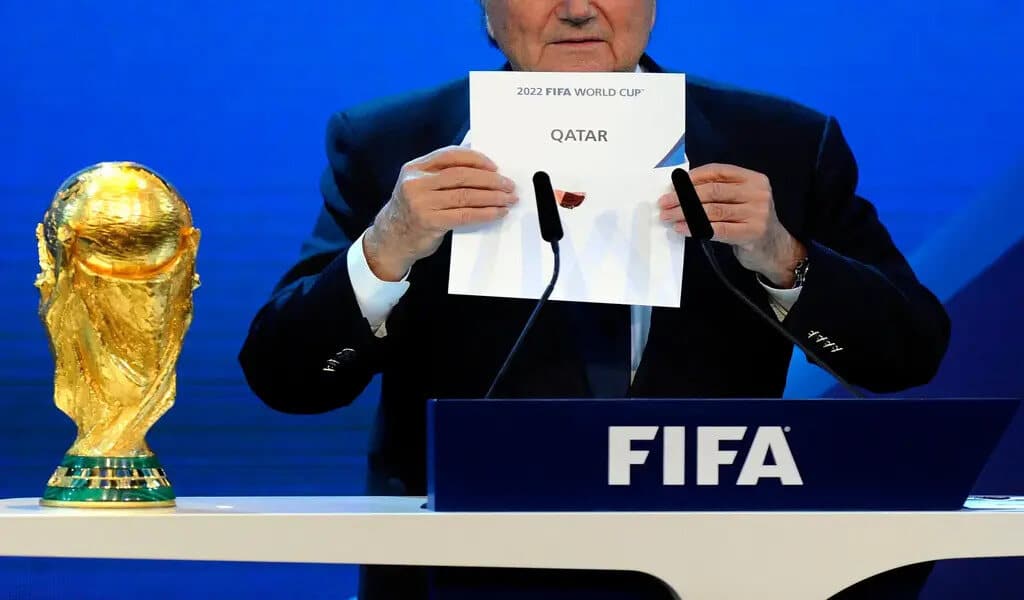
The former FIFA president Sepp Blatter delivering the news in 2010 that Qatar had won the right to host this year’s World Cup.Credit…Walter Bieri/KEYSTONE, via Associated Press
Qatar was a desolate Persian Gulf outpost for much of the 20th century, more renowned for pearl diving than for power struggles. Its citizens lagged behind their Saudi counterparts in poverty.
Next, Qatar released gas.
The largest gas field in the world was discovered in 1971.
Which resulted in Qatar’s initial metamorphosis into one of the richest nations in the world and gave its leaders the confidence to view their country not just as an adjunct of its wealthier neighbours but as a legitimate geopolitical opponent.
So the bid to host the World Cup was just another step in their effort to share their story and make an impression on the world.
Since many years ago, Qatar has dismissed criticisms of its World Cup bid as jealousy or Western racism.
However, having the means and the will to host the competition was one thing. Being granted permission to do so was quite another. That was Qatar’s main issue in 2010 as well.
Harold Mayne-Nicholls arrived in Zurich about a week before the 20 members of FIFA’s executive committee, including Blatter and Platini.
They were expected to decide which of the five contending bids would be awarded the privilege to host the 2022 World Cup.
Mayne-Nicholls, a classy, soccer-crazed Chilean, had a lot of influence, at least in principle.
The evaluation reports his team produced, which FIFA sent out to inspect each bidder, had the ability to change the outcome of the vote. He was the team leader.
His assessment of Qatar, resulting from a three-day trip to Doha in September 2009, was far from enthusiastic.
The inspectors had seemingly insurmountable qualms even though the country had pulled back on some of its earlier ideas, which included creating an artificial island large enough to be visible from space.
First, Qatar was too little. It was a major organisational challenge, according to Mayne-Nicholls. And No. 2: It was simply too hot during the (Northern Hemisphere) summer, the customary time for the World Cup to be played.
By constructing a temporary stadium to show off the cutting-edge air conditioning equipment it said would guarantee that all of the games would be played in nearly optimal circumstances.
Qatar had valiantly attempted to allay those worries. Although Mayne-Nicholls was impressed, the problem persisted.
The issue would arise for fans on non-game days, he claimed. He stated that the temperature in June is 38 to 40 degrees Celsius, or more than 100 degrees Fahrenheit. “There is nothing you can do on the street.”
Even the Qataris thought that his decision was a crushing setback. According to one official who worked on Qatar’s candidacy, the evaluation report was “embarrassing.”
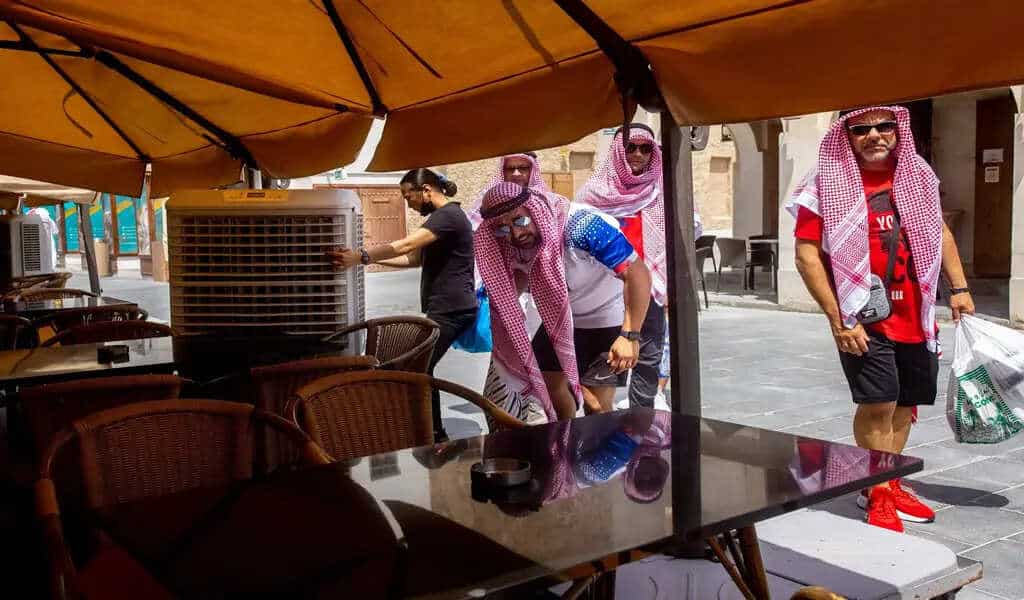
FIFA inspectors, citing the searing heat of the Gulf, label’s Qatar bid to host a summer tournament “high risk.”Credit…Tasneem Alsultan for The New York Times
But the more Mayne-Nicholls spoke with the various administrators and plutocrats on the FIFA board, the less impact his presentation had on the men who had the power to vote in favour of Qatar.
He said that only one person requested to read the entire reports. The majority seems to have decided what to do.
They informed him that the Qataris were arriving very forcefully, he claimed. They had cast their votes. I knew right away that Qatar would triumph.
His situation was hardly unique. A consultant for Qatar’s bid remembered turning to a top Qatari bid official on the eve of the vote and asking how things looked. The surety of the reply, “It’s done,” astounded him.
He was accurate. Al Jazeera, the news network located in Doha, had already reported on Qatar’s triumph before Sepp Blatter.
the FIFA president, opened the envelope to declare that the Middle East would host the World Cup for the first time.
But the repercussions had only barely begun. Due to suspension after being caught by undercover reporters trying to sell their votes, two committee members were not even allowed to cast ballots.
Then came more allegations of bribery and corruption. The US Department of Justice charged three South American voters with receiving seven-figure payments to vote for Qatar.
In fact, within a few years, nearly every one of the 22 committee members who had taken part in the voting had faced accusations or charges of wrongdoing. Numerous additional executives had been detained.
Most were expelled from FIFA, and several were banned from all soccer.
The topmost members of the corrupt pyramid had not managed to flee. Blatter reluctantly declared he would step down, but was nonetheless suspended.
Platini was also fired due to a separate ethics complaint that resulted in a fraud trial in Switzerland. (Both he and Blatter were exonerated.) It appeared for a while that FIFA itself might not survive a decision that it made.
Building on Sand
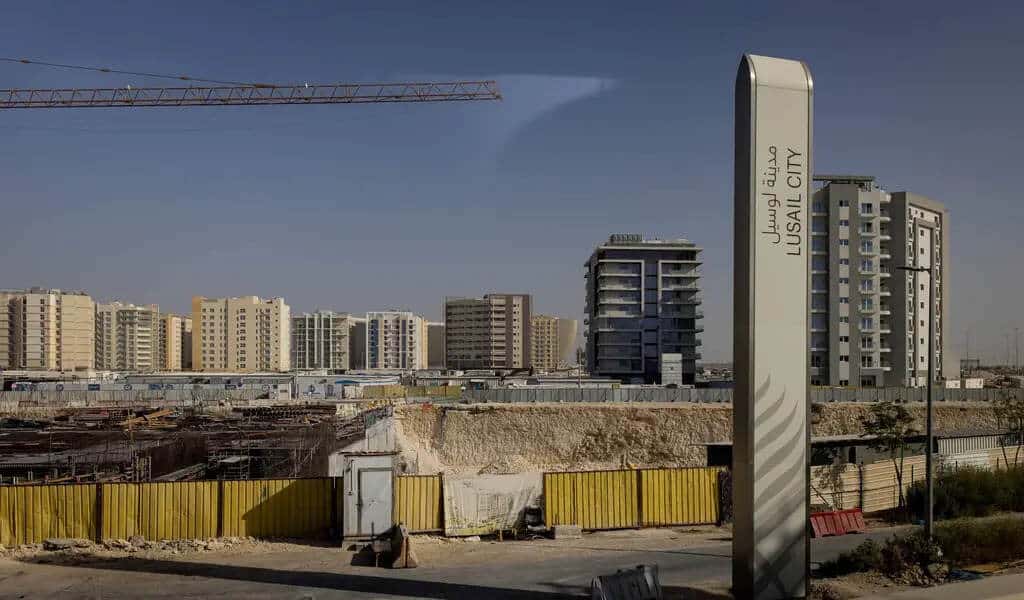
Six months before the World Cup, the areas around some of Qatar’s stadiums still resembled construction sites.
The officials of Qatar had anticipated the inquiries.
The nation’s representatives spent hours in media training sessions with public-relations experts from Europe as it polished its World Cup campaign.
Attempting to develop solutions to questions regarding the nation’s treatment of migrant workers and its stance on homosexual rights.
Given that homosexuality was and still is banned in Qatar, even the highest-ranking officials found it unsettling territory.
Sheikh Mohammed, the youngest son of the nation’s monarch at the time, responded to a simulated inquiry about the topic in a media training session that The New York Times saw by stating that all visitors to the kingdom would be welcomed.
The prince replied, “It’s unlawful in most countries,” when a media trainer pointed out that a reporter would ask how it can be reconciled with laws that criminalise homosexuality. His eyes darted from side to side, uncertain. Is it not?
He asserted that Qatar “had already taken the required steps” to protect migrant workers when questioned about the nation’s treatment of them at a previous time. Everyone in this town respects the migrant workers, he continued.
All the planning ended up being for nothing. The inquiries were never made.
Instead, the news media’s attention during the bidding process was focused on the size of the country, its oppressive summer heat, and – most importantly – whether beer would be available during the tournament in the Muslim country.
Phaedra al-Majid, a former media consultant to the bid who later accused Qatar of breaching ethical guidelines to win the event, said: “I sat in on so many interviews, and nobody would inquire.”
It didn’t matter. “No one thought Qatar would win,”
The challenging questions didn’t surface until after it had won the championship. And they still go on.
The construction of seven stadiums and the renovation of an eighth stadium were not the only requirements of Qatar’s World Cup plan.
Nothing less than a completely redesigned country, rising from the sand in a $220 billion nation-building project, was required.
As well as an extensive network of highways and railroads to convey spectators between the arenas and dozens upon dozens of hotels to accommodate them.
To accomplish it, Qatar attracted tens of thousands of migrant workers from some of the world’s poorest regions, causing the population of the nation to increase by 13.2 percent in the past year alone and generating a great deal of attention for the treatment, rights, and living conditions of the workers.
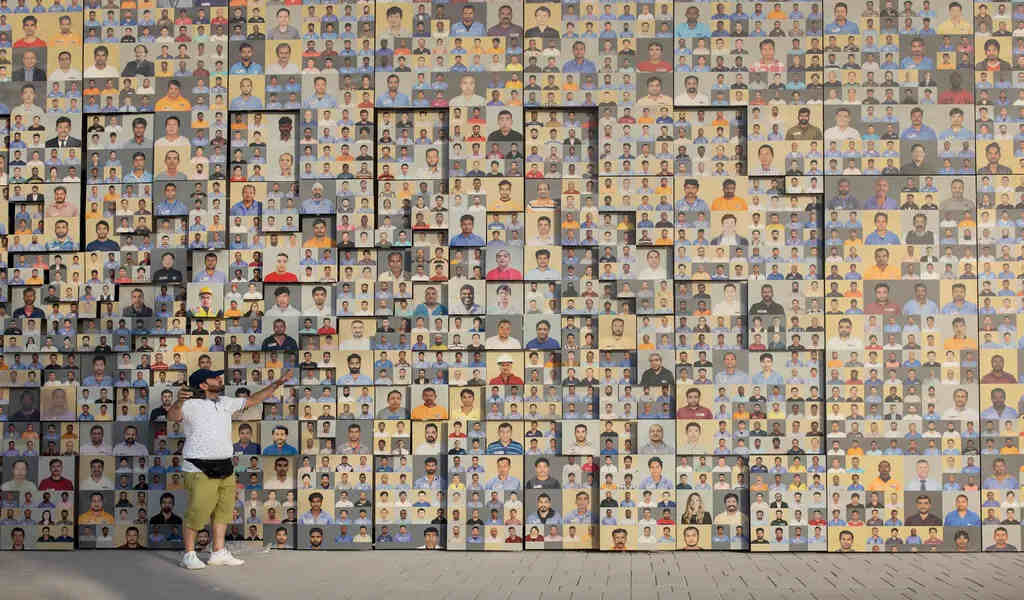
Mosaics at several stadiums display photos of the tens of thousands of migrant workers who built them.
The number of deaths during the past ten or more years is unknown and may never be. Many more have arrived home unwell, hurt, or without the promised compensation.
According to Michael Page, deputy director of Human Rights Watch’s Middle East and North Africa section, “this event was wholly built on the backs of migrant workers, on a grossly unfair balance of power.” These abuses were quite likely to occur.
Even if Qatar has now stopped the majority of construction projects and sent home the majority of the employees ahead of the World Cup, it still depends on foreign labour:
To supplement an understaffed local police force, security experts from Turkey, Pakistan, Egypt, and France, among other nations, have been imported.
Meanwhile, more migrant labourers have arrived to work in hotels, stadiums, and food service.
But despite its tiny size, the nation’s ambition is unabated. For instance, Qatar announced this summer that it will host a dance music festival at Ras Abu Fontas, just south of Doha, as part of the World Cup.
The festival would feature a fire-breathing, laser-shooting spider that had been taken from the Glastonbury music festival in England.
The majority of nations scale back in the months leading up to a competition, according to Ronan Evain, director of Football Supporters Europe. “Qatar has only continued to grow.”
According to the organizers, the goal is to guarantee an unmatched fan experience.
It will undoubtedly be different: Only a few days before the World Cup’s first game, Qatar decided to break its agreement to allow the sale of beer at its eight World Cup stadiums, shocking FIFA and spectators alike.
It will still be accessible in some World Cup locations, including as during designated fan zone hours, but on Friday it was clear that the hosts had, somewhat belatedly, changed the tournament’s customs to conform to local laws.
The abrupt change in plans raised additional concerns about whether everyone will receive the kind of welcome that FIFA and Qatar’s organizing committee have long promised.
This month, Khalid Salman, a former member of the Qatari national team now serving as a World Cup ambassador, didn’t appear to have listened to the organizers’ messages.
He stated to a German documentary that homosexuality was haram, an Arabic term that generally means banned. “It is prohibited because it causes mental harm.”
The Game Changer
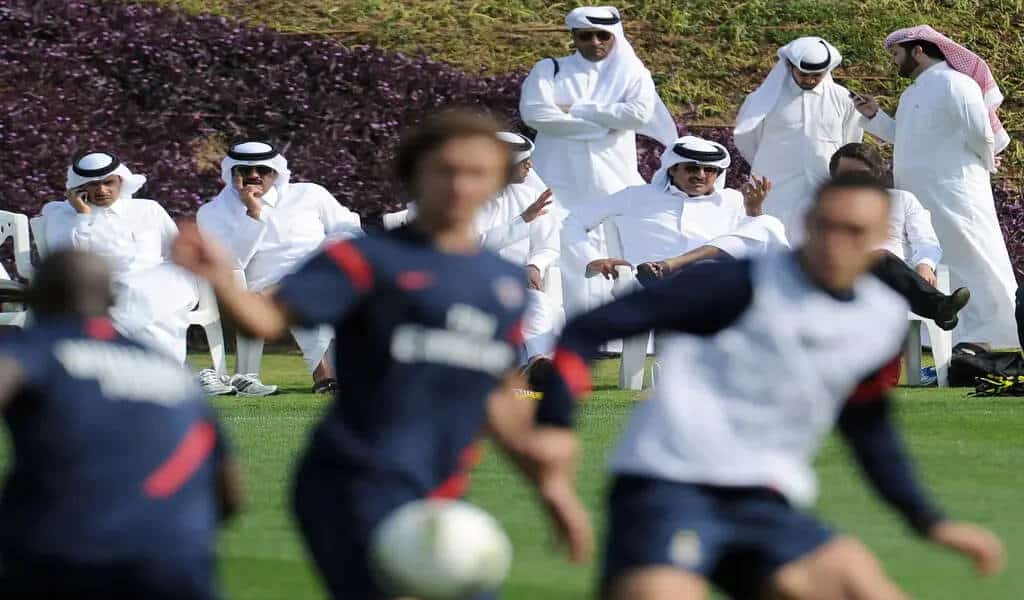
Sheikh Tamim bin Hamad Al-Thani, then the crown prince of Qatar and now its emir, at a Paris St.-Germain training session in 2012 in Doha.
Javier Tebas was enraged.
Along with representatives from FIFA, the other major soccer leagues, and the European Club Association, an organization that defends the teams’ interests, the outspoken head of Spain’s top league came in Doha.
They had to provide an answer to a question that had never needed to be asked: Specifically, when should the World Cup be held?
Qatar has claimed there was no reason the tournament couldn’t be hosted in its customary timeframe in the European summer both before and for several years after the Zurich vote.
The organizers assured that the oppressive Gulf heat wouldn’t be an issue because they planned to install the air conditioning that had wowed Mayne-Nicholls and his staff in each stadium.
But by 2013, things had changed. FIFA formed a task team to investigate the viability of shifting the World Cup.
It issued a study at the beginning of 2015 and suggested moving the competition to November and December, right in the thick of the European season, which generates the majority of the attention and revenue in the sport.
Tebas assumed the battle lines were established as he came in Doha for negotiations on the subject that year: According to Tebas, the leagues and the clubs “were against the dates” FIFA was recommending.
But that agreement did not hold. After FIFA boosted the cash the clubs would receive for releasing players for the competition, the clubs agreed.
Tebas remembered getting angry when he was told and slamming his hands on the table. He claimed, “It was all for show. It appeared as though we were being duped.
But in many respects, the unwelcome break for Europe is the least of the effects of FIFA’s choice to award Qatar the World Cup. A year-long change in the game’s environment is significantly more impactful than a momentary interruption to a single season.
When Platini, Sarkozy, and the Qatari group met at the Élysée Palace in November 2010, more than just the World Cup’s future was on the table.
The future of Sarkozy’s favourite team, Paris St.-Germain, was also in question. (Sébastien Bazin, its president at the time, was also in Sarkozy’s office that day.)
Qatar wants to finance the whole of French soccer, purchase the team, and launch a sports network to air its matches. It was already doing it less than a year later.
P.S.G. started a costly spending binge that no domestic opponent could even imagine, acquiring star after star as it sought to overcome Europe’s traditional powers.
Backed by Qatar Sports Investments’ ostensibly limitless resources. Individually and collectively, the actions would have a significant and long-lasting effect on European soccer.
In the summer of 2017, PSG displayed its financial prowess in the brazenest manner yet:
it doubled the previous world transfer record by acquiring Brazilian forward Neymar from Barcelona for $222 million, and a few weeks later added French forward Kylian Mbappé for an additional $180 million.
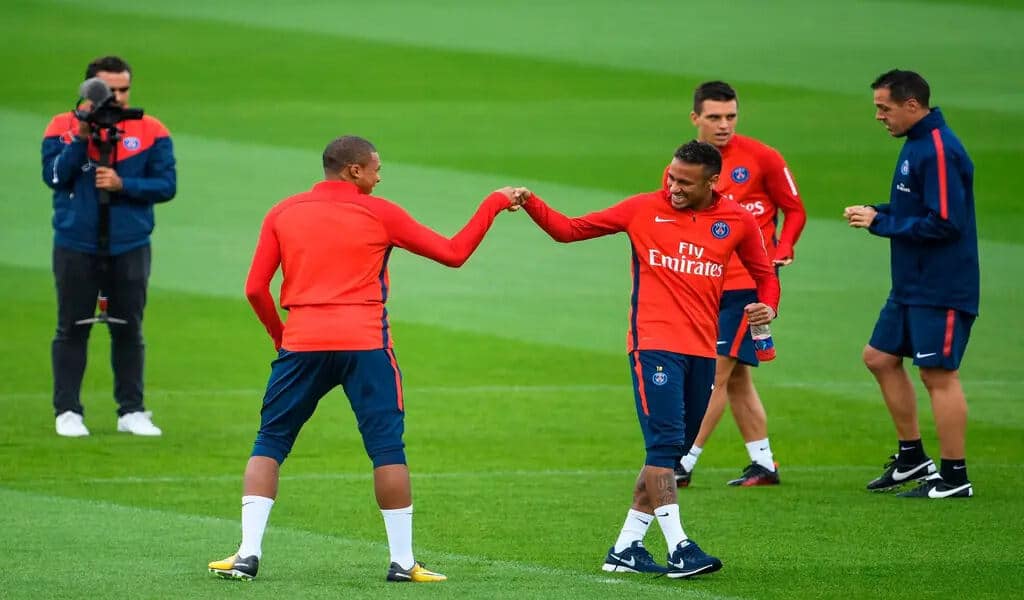
P.S.G.’s French forward Kylian Mbappe, left, with his Brazilian teammate Neymar in 2017.Credit…Christophe Simon/Agence France-Presse
The two transactions at once caused a permanent shift in the transfer market.
Qatar, however, was not done yet. As part of an expansion into Europe that was also agreed upon at the Élysée conference.
Its television network, beIN Sports, quickly rose to the position of the world’s ravenous sports media rights collector. Nasser al-Khelaifi, BeIN’s charismatic CEO, is also the head of P.S.G.
Additionally, he serves on the UEFA board of directors. Last year, he was appointed head of the European Club Association.
He took over that position following the unsuccessful launch of the European Super League, a purported replacement for the Champions League created by several of soccer’s most illustrious clubs.
Executives involved in the plan claimed that their motivation was to save the sport; however, at least a portion of their driving force was to try to restrain P.S.G.
And Manchester City, the wealthy English team owned by a group closely associated with the ruling family of Abu Dhabi. Manchester City is a deep-pocketed English team.
According to their competitors, the spending of the two teams has altered soccer in such a way that any team that tries to keep up will likely collapse.
They must point to the sole team that attempted proof of such. Barcelona was deeply hurt by Neymar’s departure, and it soon became enmeshed in an inflationary cycle.
By 2021, its financial situation had gotten so bad that it could not continue paying Lionel Messi, the best player in its history. In a tear-stained press conference, he said goodbye to the only club he had ever known.
A short while later, he was seen on camera at a Barcelona airport. Of course, he was going to P.S.G.
Show Must Go On
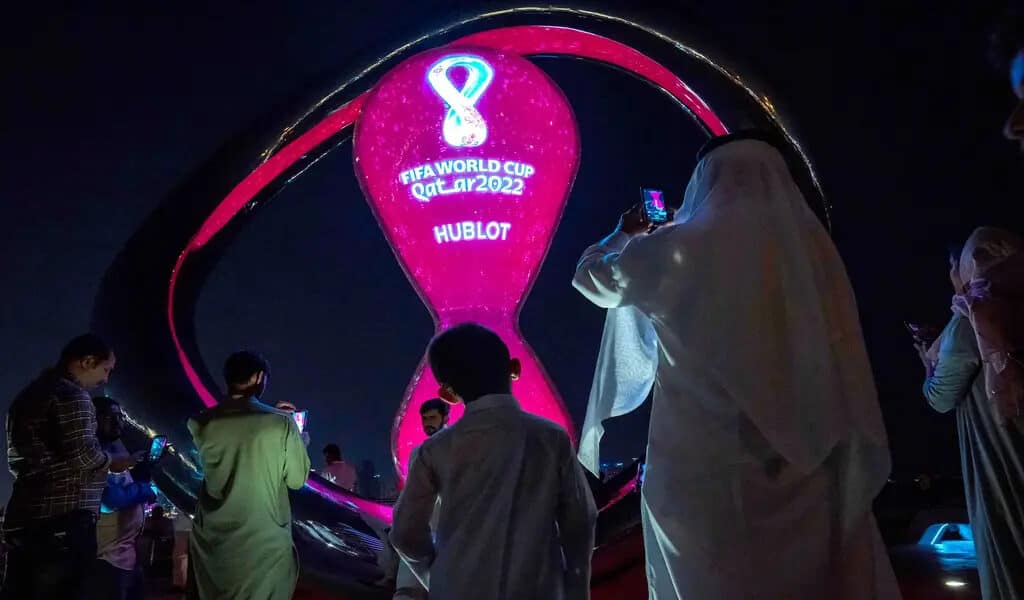
On Sunday, more than 12 years after Qatar won the rights to the World Cup, its national team will play in the tournament’s opening match. Credit…Nariman El-Mofty/Associated Press
The 32 nations that had qualified for the World Cup received letters from Gianni Infantino, Blatter’s replacement as FIFA president, a few weeks prior to the event.
Infantino, currently a resident of Qatar, pleaded with them all “not to let football be dragged into every existing ideological or political fight.”
It was time to let the sport “take the stage,” he remarked.
That might already be too late. The criticism of FIFA’s choice to hold the tournament in Qatar only intensified as the event drew near.
A growing number of players, coaches, apparel producers, and, in especially, fans, have expressed their objections publicly
. England and Wales’ respective captains have agreed to don a special armband supporting homosexual rights. Blatter recently acknowledged that choosing Qatar was “a mistake.”
In turn, Qatar’s response has seen a steady increase in outrage.
The nation’s emir, who attended the meeting with Platini at the Elysée as crown prince, struck out last month at what he called a “unprecedented” campaign of Western criticism.
Two weeks ago, the foreign minister of Qatar referred to the concerns over the country’s eligibility as “extremely discriminatory.”
FIFA has not always been so against utilizing soccer for political ends.
FIFA, as a body, has consistently defended its choice to travel to Qatar by claiming that sport can be a force for progress, despite all of the inquiries, warrants, and arrests.
It is difficult to avoid feeling that it is the other way around: Soccer may or may not change Qatar, but Qatar has changed soccer forever.
This is especially true as the tournament that the host nation was willing to pay almost any price to obtain gets underway and as the world’s attention turns to a tiny corner of the Gulf.
RELATED CTN NEWS:
FIFA World Cup 2022: When is the Opening Ceremony and Who is Performing?






























